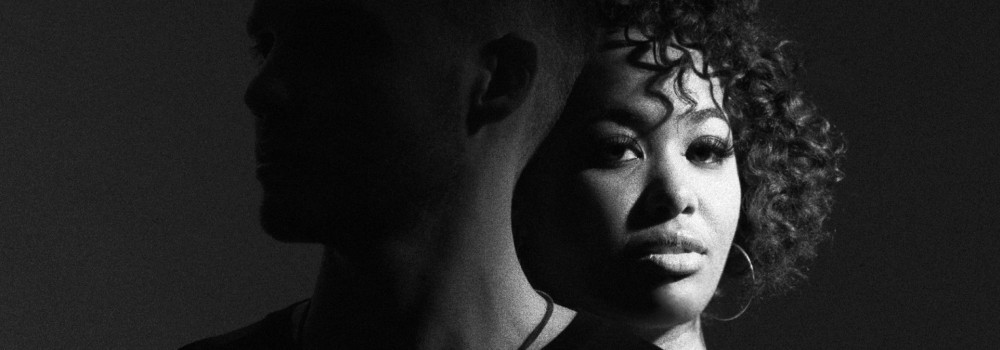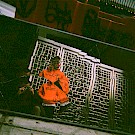
Seated at a creaky table inside Rontoms on East Burnside, Brian Vincent and Randa Leigh excitedly trample over each other’s words. A month away from the release of SOS’ self-titled album, Leigh’s eyes widen and Vincent’s voice rises with enthusiasm as they explain the creative process behind their ambitious project.
Following a brief pause to consider the alt-R&B duo’s long-term goals, Vincent sets his glass of whiskey on the table and looks me directly in the eyes.
“We want to be fuckin’ huge,” he says.
The words are backed by a contagious sense of youthful enthusiasm that transforms an otherwise brash statement into something much more endearing—and revealing. Vincent’s comment hints at the unfiltered honesty and willingness to color outside the lines of convention that lie at the core of the duo’s wildly inventive style.

SOS aren’t the falsely modest by-the-book pop artists we’re used to and their background goes a long way to explain that. Both Vincent and Leigh have Oregon roots and home addresses in Portland, but it might be more appropriate to think of their location another way: They’re from the internet. Coming of age as musicians in an era shaped by social media, blogs and Pro Tools, they found their influences and creative platforms on a computer screen—not in their neighborhood. This inspired a DIY mentality and willingness to stray from long-standing norms, producing a distinctive sound that couldn’t have existed pre-internet.
It’s difficult to imagine their throbbing basslines, trap-inspired percussion and woozy, atmospheric synths existing in an accessible, harmonious R&B package even a few years ago. Understanding the unique time they live in as musicians, SOS doesn’t shy away from taking advantage of the endless innovative resources available to a musician in 2014, relentlessly experimenting with electronic tools to conceive new sounds.
“We actually do use guitars and live drums on the album, but we try to use it more as if it were a sample,” Vincent explains. “I think about it like this: In their heyday, The Beatles were doing all sorts of crazy things like having people build them synthesizers that other people didn’t have so they could do things first. Would they have been purists in this generation? Hell no. They would have been doing the craziest shit they could think of. They were doing everything they could to sound like what’s next.”
Leigh gives some insight into their creative process, adding, “We’ve made crazy sounds out of the weirdest shit you could think of. Just things we find around the room. I mean, I’ve seen Brian make music out of crinkling paper in front of the microphone.”

The duo’s use of technology doesn’t stop at gear. After the digital release of a free LP in 2012 under the name Shadows On Stars, they took advantage of Tumblr to create a mood board for a follow-up project and used Google Docs to sketch out a concept map. Realizing that they had tried to combine all of their many influences into a dense punk rock, R&B, pop, hip-hop and soul album with that first effort, they charted out a simplified sonic direction that allowed their songs more space to breathe. Discovering that less is more in a crowded information age, they took minimalism to heart, even truncating their name.
“As we were making this record, we realized it doesn’t really sound like Shadows On Stars as much anymore. But that’s where we came from, so we don’t want to completely abandon it. Since we’re narrowing the sound of the music in on one thing, we thought we’d just narrow the name down too,” Vincent reveals. “Narrowing to SOS helped us reel in all of our influences. Even though we like all these things, this is what SOS is and we’ll go with that.”
Without being heavy-handed about it, they’ve managed to capture the slippery spirit of a generation raised by the internet. Their straightforward, vulnerable take on relationship-driven songwriting has little in common with the clichéd love songs of decades past. Don’t expect to hear an SOS song on the soundtrack of the next cheesy romantic comedy you see.
It’s much easier to imagine this stuff playing through a 24 year old’s headphones as he taps out a deeply personal message about an ex-girlfriend to every person he’s ever met via social media. Like their peers, Vincent and Leigh aren’t content keeping their personal thoughts locked in private journals. They’d rather open up and expose themselves to anyone who will listen.
“We want to make music that people can secretly relate to,” Leigh notes, “even if they’re too scared to admit it.”
In the same way that SOS are a reflection of their generation’s internet-tinted perspective, their music serves as a fitting soundtrack for countless 20-somethings struggling to adapt to a culture constructed by their parents under an increasingly outdated set of rules.
“It’s about that time in your life when you’re fresh out of college and really excited to be out on your own. And then everyone starts asking you, ‘So, what’s the next step? What are you doing? How much money are you going to make?’ All of that weighs down on you and sometimes you’re like, ‘I still want to party like I did last year. I’m better off drunk or high than this. Fuck it. I still want to be young. I’m going to let my youth fade away instead of just instantly becoming an adult,’” says Vincent as he explains the meaning behind the duo’s lead single “Youth In Decline.”
As they navigate toward adulthood themselves, Vincent and Leigh have their eyes set on music as a long-term career and have approached the business side of things the same way they’ve looked at everything else—through an independent, tech-heavy lens. Taking advantage of digital distribution, blog exposure and social media, they’ve enjoyed the benefits of directly interacting with a fan base and maintained the artistic freedom to do what they know will resonate with their peers.

With the goal of connecting with a multimedia-obsessed generation, the self-titled album’s narrative is held together by a collection of popular television and movie sound bites (including clips from recent hits Blue Valentine, Mad Men and Get Him To The Greek) as well as nods to hip-hop heavyweights Kanye West and Rick Ross. Over the course of 42 minutes, they impressively manage to boil down a cross section of youth culture into a neat package that feels relevant to a specific point in time without coming across as a desperate attempt at appearing trendy.
Their efforts seem to be resonating outside of computer screens as well. Midway through an album release show at Mississippi Studios in August, Vincent took a moment to acknowledge two young lip-locked fans in the second row who seemed to be taking the band’s sexually charged lyrics to heart, laughing, “Shout out to these people right here making babies and shit.”
Unconcerned with the crowd’s judgement, the couple didn’t skip a beat and continued their unapologetic display of public affection. For a band looking to capture and connect with passionate, carefree, youthful spirits, it’s tough to think of a better sign of success than that.





